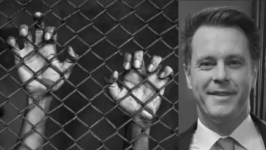NSW Government Proposes to Ensure More Kids Are Criminally Convicted

There have been media reports that a High Court case in 2016 which makes clear the onus is on the prosecution to prove that those under the age of 14 knew their conduct was ‘seriously wrong’ in order to secure a conviction for a criminal offence has resulted in a significant a decline in the percentage of children who are charged with criminal offences being convicted.
Now, the New South Wales government will conduct an inquiry into the doctrine, known as ‘doli incapax’, which presumes that children under the age of 14 years are incapable of forming the mental element of a crime, also known as the mens rea necessary to establish a criminal offence.
The inquiry could result in the introduction of legislation that effectively overturns the threshold set by the High Court for convicting children aged over the age of 10 but under the age of 14 years old, making it easier to convict children of that age.
Doli Incapax
Doli Incapax is a legal doctrine that relates to the age of criminal responsibility in Australia and NSW. It presumes that those under a certain age are ‘incapable’ of the intention to commit criminal offences.
Unlike a number of other Australian jurisdiction which have legislated the presumption into law, New South Wales relies on ‘common law’ – which is law built up from court decisions rather than introduced by legislation – which provides that children between 10 and 14 years old cannot be held responsible for a criminal offence unless the prosecution proves the child knew their conduct was seriously wrong, and not just ‘naughty’ or that the actions could be wrong.
The age of criminal responsibility
The age under which a child cannot be found guilty of a criminal offence in any situation is known as the ‘age of criminal responsibility’.
This age is contained in section 5 of the Children Criminal Proceedings Act 1987 (NSW) which applies to New South Wales offences and states ‘no child under the age of 10 years can be guilty of an offence.’
Section 7.1 of the Criminal Code Act 1995 (Cth), which relates to Commonwealth offences, states ‘a child under 10 years old is not criminally responsible for an offence’ under the act.
High Court Case
The High Court case of RP v The Queen [2016] HCA 53 involved sexual offences committed by a boy against his younger brother. The four alleged sexual offences were supposedly committed by the boy when he was between 11 years and six months and 12 years and three months.
The judge in the initial case in the District Court of New South Wales acquitted the boy of one charge, but convicted him of the remaining three sexual offences. The five High Court justices were left to determine if the prosecution had not considered doli incapax concerning the accused boy.
The four justices of the case clarified the following:
- Doli incapax applies to children 10 to 14 years old,
- The presumptions based on a child under 14 years old not being ‘intellectually and morally developed to appreciate the difference between right and wrong’,
- Doli incapax assumes a child under 14 years old does not know their actions are ‘seriously wrong’,
- A child cannot be held criminally responsible for their actions,
- The prosecution bears the legal onus of proof,
- The standard of proof is beyond a reasonable doubt,
- Knowledge of the moral wrongness of the act is to be distinguished from merely ‘naughty’ or ‘mischievous’, and
- The presumption cannot be rebutted merely as an inference from the doing of that act or acts.
The result of the RP v The Queen case set the precedent for the principles of doli incapax and how to determine a legal rebuttal.
Results of the 2016 Case
The 2016 high court ruling clarified the meaning of doli incapax, leading prosecutors to prove that the adolescent understood the consequences of their actions and that they were seriously wrong when committing the supposed crime. Since this case, conviction rates of children aged 10 to 13 have significantly declined.
The NSW Bureau of Crime Statistics and Research (BOCSAR) report showed that 10-to-13-year-olds with a guilty or not-guilty outcome fell a dramatic 60% to just 16% in 2022-2023. The prosecution withdrew charges, following suit in other states like South Australia and Victoria.
In other states, like Queensland, doli incapax had been clarified in legislation rather than in common law, as it was in NSW, resulting in a lack of legislative reforms or improvements. The attorney general noted that the result in terms of the percentage of child prosecution cases raised questions about how to reduce adolescent crime across the country.
According to the BOCSAR report, Indigenous and Aboriginal children living in remote areas are represented at a much higher rate in the criminal justice system in comparison to the percentage of Aboriginal people in the country.
Furthermore, Aboriginal individuals are not the only ones who are ‘criminalised’ at an alarming rate. The report found that putting younger children in prison doesn’t address the causes of the crimes, but only ‘increases the risk of recidivism’. Currently in NSW, the youth justice system is about ‘90% full’, indicating that the arrest rates are increasing, along with the youth crime rate.
Recommendations of Human Rights Commission
The minimum age of criminal responsibility is low in Australia compared to other countries, at 10 years old.
In response, the Australian Human Rights Commission has advocated for raising the age of criminal responsibility due to the following:
- Children in the criminal justice system might need a more multifaceted approach,
- Aboriginal and Torres Strait islander children in detention are overrepresented,
- 10-year-olds do not have the same level of maturity to form the necessary intent for criminal responsibility,
- Children under 12 years old cannot properly engage in the criminal justice system,
- Criminal offending by children is generally nonviolent or property-related,
- Younger children have higher recidivism rates, and
- More than 50% of children in juvenile detention facilities have never been convicted or sentenced.
In 2019, the Committee on the Rights of the Child recommended that all countries increase the minimum age to 14 years, urging the Australian Government to raise the age at which doli incapax applies. In October 2019, the Crimes Legislation Amendment (Age of Criminal Responsibility) Bill 2019 was introduced to the House of Representatives to increase the minimum age of criminal responsibility to 14, but the Bill has not proceeded.
NSW reviewing this law would raise the age of criminal responsibility and possibly reduce the number of children incarcerated and the recidivism rates within the country.






